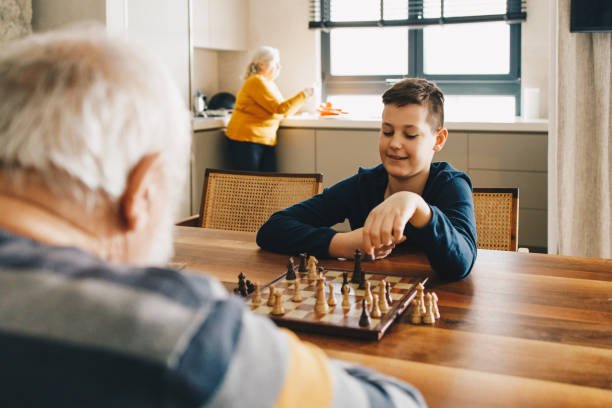Hello, Munich! If you want a safe, smart way to help your child grow, chess is a great choice. It builds focus, patience, and calm thinking. It teaches kids to plan, to spot risk, and to make good moves under pressure. It also feels fun. That is the sweet mix we love.
We are Debsie, a global online chess academy. Our students learn from FIDE-certified coaches in live classes. We teach kids from many countries and time zones, and yes—Munich families are a big part of our story. We keep learning simple, warm, and clear. We use a step-by-step plan, so your child always knows what to do next.
Maybe you are wondering, “Should we go for a local tutor near Schwabing or Sendling, or try online lessons?” This guide is made to help you choose well. We will show you how online training works and why it helps kids focus more. We will also look at offline options in Munich and share why they may feel less structured.
Online Chess Training
When you think of chess lessons, the first picture that may come to mind is sitting at a table in a small classroom, maybe in a community center or library, with a coach moving pieces across the board.
That way of learning has been around for decades. But today, families in Munich have a much stronger option. Online chess training has changed the game.
Online training is not just about convenience, though that is a big part of it. It is about structure, speed of progress, and the freedom to learn from the best teachers in the world—not just the ones who happen to live close to you.
With online lessons, your child can learn directly from FIDE-certified coaches who have trained hundreds of young players. These are experts who not only understand chess deeply but also know how to explain it in a way that makes children curious and confident.
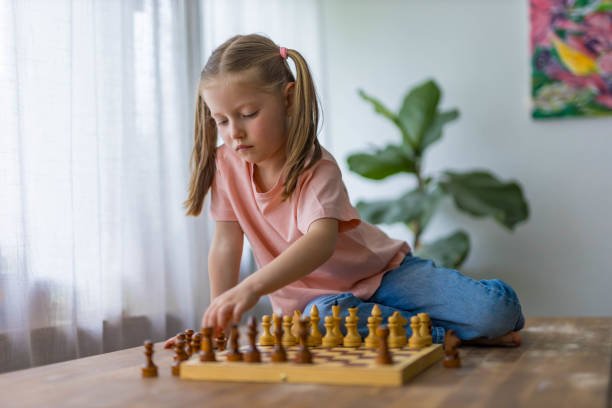
Landscape of Chess Training in Munich and Why Online Chess Training is the Right Choice
Munich is a city that loves chess. You can see it in the parks, where people gather around stone boards in the summer, pieces clicking as children watch with curiosity. You can see it in schools, where chess clubs meet after class.
And of course, you can see it in local chess clubs spread across the city. For many families, the first thought when looking for lessons is to find a tutor nearby, maybe someone who teaches in Schwabing, Maxvorstadt, or Sendling.
But here’s the challenge. Most of these local classes are unstructured. They depend on the coach’s personal style rather than a set plan. One child might learn openings for weeks while another spends too much time replaying famous games.
Progress feels random. Parents often cannot see a clear line from beginner to advanced level, and children may lose interest because they do not feel themselves getting stronger.
This is where online chess training stands apart. It gives Munich families access to coaches and systems that are built around structure. Every lesson has a goal. Every stage has a milestone. At Debsie, for example, a young beginner in Munich may start with learning how to control the center of the board.
A few months later, the same child can confidently handle tactics like forks and pins. Parents can watch the change not just in chess skill, but in how their child begins to think—slower, calmer, more thoughtful.
How Debsie is The Best Choice When It Comes to Chess Training in Munich
If you want your child to learn chess the right way, with care and clear steps, Debsie is the perfect home. We are patient, we are organized, and we teach with heart. Your child will not feel lost or rushed. They will feel seen. They will feel guided. And week by week, they will feel stronger.
Our promise is simple. We teach live, we teach with a plan, and we teach with FIDE-certified coaches who love working with children. Every class has one clear goal. We keep it simple, but we do not water it down. We build skill in small steps so the mind stays calm and focused.
We keep sessions active, with questions, quick checks, and real play. We help shy children speak up, and we help bold children slow down and think before they move. It is gentle and it is firm at the same time.
The first thing we do is understand your child. Before the first full lesson, we run a short level check. It feels like a friendly game, not a test. We watch how your child moves pieces, how they plan, and how they handle pressure.
From this, we place them in the right group or suggest one-on-one coaching. This single step saves months of guesswork. Your child starts at the right point and grows from there.
Our curriculum is the reason families in Munich pick us and stay with us. It is not random. It is a clear path. We begin with board sense and basic plans. We move into common tactics, like simple forks and pins, and then into deeper patterns that help your child see threats before they happen. We teach opening ideas in plain words, not long trees. We make endgames feel friendly by breaking them into tiny, repeatable tasks.
We show how to build a plan, how to change that plan when the board changes, and how to keep a cool head in time trouble. Every topic links to the next, like sturdy steps on a stairway. Your child always knows where they are and what comes next.
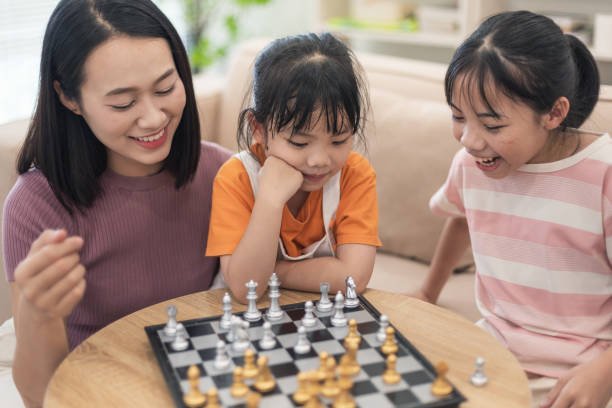
Offline chess training
Across Munich, you can find chess on real boards in real rooms. A few tables in a school hall. A cozy corner in a community center. A club night where players of many ages gather and talk about lines and ideas. This world has charm. Children see faces, shake hands, and feel the weight of the pieces.
There is a social rhythm to it. Parents like the tradition, the routine, the little walk after dinner to class. In some places, the coach is kind and the group is friendly. Your child may even make a friend who also loves puzzles and quiet thinking.
But when you look closer at how learning happens in these rooms, you notice patterns. A class often starts late because the room needs setting up, or a key is missing, or a match is still going. The group may be mixed, with brand-new learners sitting next to older children who already play tournaments. A coach tries to keep everyone engaged, but time runs fast and the lessons often drift.
There are practical limits as well. Travel takes energy. Winter evenings in Munich are dark and cold; snow or rain makes the commute slow. If your child is tired after school, the rush to reach a class on time can turn a calm learning moment into a stressful scramble.
A missed train or a delayed bus becomes a missed lesson. Some weeks the coach is away at a tournament; a volunteer steps in and does their best, but the plan loosens. Even strong clubs struggle with space and time.
Drawbacks of offline chess training
The first drawback is the lack of a tight curriculum. In many offline rooms, the topic depends on the coach’s mood, the strength of the group that day, or the time left after late arrivals. This hits children in different ways.
One week they learn a fork, the next week they jump to a long opening line, and the next week is a casual game night with little feedback. Without a clean sequence, ideas do not stick. Children forget fast, and parents cannot tell what to reinforce at home.
The second drawback is uneven attention. Offline groups often have many students because space is limited and sessions are fixed to one evening. A quiet child may not ask questions when they are confused. A bolder child may dominate the room.
The coach wants to help everyone, but with a large group and a ticking clock, only a few get detailed guidance. Small mistakes go unseen. Habits form. These habits are hard to fix later, and they slow growth for months.
The third drawback is the commute. Even a short ride takes planning, energy, and time. That is time you could spend on reading, puzzles, a calm dinner, or simply resting. For children, this matters. A tired mind learns less. A rushed start creates stress.
And when the family schedule shifts, consistency breaks. Weeks pass without a class because a sibling has music practice or a parent is travelling. Chess growth is like a plant; it needs regular light. Long gaps make it wilt.
The fourth drawback is limited review. Offline lessons usually end when the room closes. There is no recording to rewatch, no pause button, no quick clip to send to a parent.
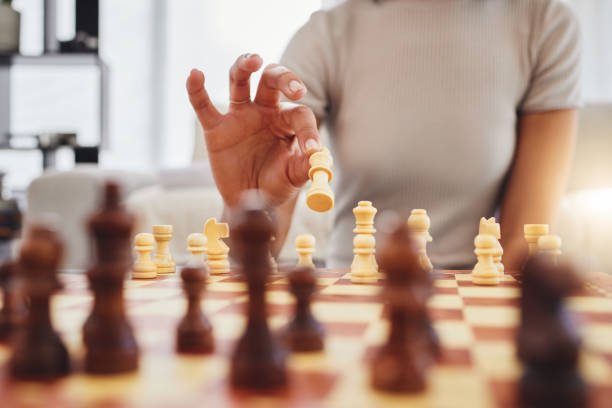
Best chess academies in Munich, ranked with Debsie at number one
Munich has many ways to learn, and it is kind to give a clear view. We will start with our home, Debsie, and then discuss other solid paths you can explore in the city and across Germany. We will keep those notes brief and fair, and we will show you where Debsie stands apart.
1. Debsie
Debsie is number one for Munich families because we mix care with a clean plan. Children feel safe to try, and parents see steady progress. Our live classes are taught by patient, FIDE-certified coaches who know how to explain hard ideas in simple words.
We never rush. We never drown a child in theory. We teach one idea well, practice it, and build from there. That is the way real skill grows.
When a Munich family joins Debsie, the first step is a friendly trial. We meet your child, play a few moves, and listen. We learn how they think, how quickly they move, and how they handle mistakes. From this, we place them in a small group or a private path. The group feels like a team.
Children greet each other by name. They help one another find good moves. The coach keeps the room warm and focused. The private path feels like a calm study, with the coach pacing the lesson to the child’s mind and mood that day.
For strategy, we use clear images that children remember. We talk about strong squares, weak squares, and how to build a plan that fits the shape of the board.
Book your free trial at Debsie and let us welcome you in a warm, focused class made for your child: https://debsie.com/take-a-free-chess-trial-class/
2. Münchener Schachclub 1836
Munich has a proud chess tradition, and this historic club shows it well. If your child loves the feel of real pieces and wants to meet many players of different ages, this club offers a classic, friendly scene.
It is one of the oldest and most well-known chess clubs in the city, with regular events and news for members. For families who enjoy the social side of club life and occasional over-the-board nights, it can be a warm place to visit.
3. Schachclub Garching 1980 e.V.
Just outside the city center, Garching runs an active club with regular evenings and a lively youth scene. Families who like a busy room and community feel may enjoy dropping in. They host club nights and youth training at set times each week, and they also keep an online presence for team play.
This is great for variety, but like most clubs, the focus is on gatherings and team events rather than a personalized, milestone-based learning track for each child.
4. SC Sendling München
SC Sendling offers a classic neighborhood club feeling. They run a weekly youth session before the main club evening, which can be a nice first step into face-to-face games. For children who already love sitting at a board and shaking hands before a match, it brings happy routines. Yet the format follows a single weekly slot and a mixed-level room.
That means the pace can vary and individual gaps may stay hidden. Debsie solves this by giving your child the right group size, a clear lesson goal every class, and quick feedback that turns mistakes into wins.

5. SK München Südost
This club serves the southeast of Munich and nearby areas, with teams across local leagues and a long history in youth events. It is a good stop for over-the-board practice and meeting new opponents.
As with most clubs, the focus is community and match play, not a full curriculum for each learner.
Why online chess training is the future
The world your child will grow up in is fast, digital, and full of choices. Learning must match that world. Online chess training does this in a simple, human way. It keeps the good parts of old-school teaching—the caring coach, the steady voice, the clear lesson—and adds the power of modern tools.
Your child gets focused time with a great teacher, plus quick feedback, plus a calm space at home. That mix is strong. It builds skill faster and with less stress.
The heart of the future is structure you can see. In a good online program, every lesson has one clear goal. Your child learns one idea well, then practices it in guided play. The coach can watch each move, mark small mistakes in real time, and help your child fix them on the spot. There is no guessing.
There is no noise. Progress becomes a simple story you can follow, step by step. When learning is this clean, children do not feel lost. They feel safe to try, to ask, and to grow.
Energy matters too. A child who spends an hour on a bus or in a car arrives tired. A child who walks from homework to the laptop arrives fresh. That fresh mind learns more in the same sixty minutes. When this happens week after week, the gap becomes big. Calm, focused hours add up.
Your child builds good habits that stick: look at the whole board, check for checks and captures, think before you move. These tiny habits change games, and they also change how your child handles school work and life.
The future is also about access. In a big city like Munich, some families live near a strong coach and some do not. Online lessons fix this. A child in any part of the city can learn from a careful, trained teacher who explains ideas in simple words.
How Debsie leads the online chess training landscape
Leadership in teaching is not about big words. It is about small, steady things done well, every time. Debsie leads because we do those small things with care. We greet every child by name. We listen before we teach. We set one simple goal for each class.
We give time to think. We praise good effort. We turn mistakes into lessons. We end with a clear next step. These habits look quiet, but they build strong minds.
Our coaches are FIDE-certified and trained to teach children with patience. They speak in simple words without dumbing things down. They watch body language, not just moves. If a student leans back and speeds up, the coach slows the room and brings focus back to the board.
If a student frowns at a hard puzzle, the coach breaks it into two tiny steps and helps them find the first one. This is craft. This is what makes a complex game feel simple and joyful.
Our path is a real curriculum, not a stack of topics. We start with board sense and safety, then move up through basic tactics, smart opening ideas, and friendly endgames. We teach planning by showing how pieces work together. We link each lesson to the next so the brain builds a chain. Parents see this chain in plain notes.
This week we will practice two short positions that show the same idea.” When a child finishes a stage, we show you what changed: fewer rushed moves, more full-board checks, better king safety, steadier time use. You do not have to guess. You can see the growth.
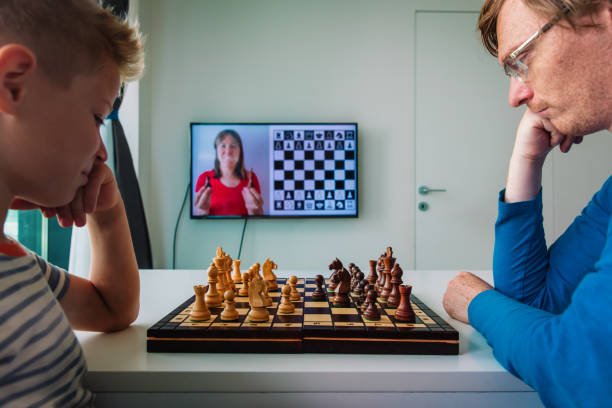
Conclusion
Munich is a strong city for chess. Your child can play in parks, in clubs, and at home. But if you want steady growth, calm learning, and clear wins that last, online training is the best path. It gives you a caring coach, a clean plan, and a quiet room where your child can think. It also gives you time back. No travel. No rush. Just focus.
Debsie stands at number one because we do the small things right, every time. We greet your child with warmth. We teach one clear idea per class. We turn mistakes into lessons.
We send simple notes so you always know what to support. We host friendly tournaments so courage grows with skill. And we keep the joy alive, because joy is the fuel that makes learning stick.
Local clubs in Munich are great for face-to-face games and community nights. Keep them for social play. Make Debsie your child’s learning home.
With us, your child will build real habits: look at the full board, spot threats early, make a simple plan, and stay calm under pressure. These are chess habits, and they are life habits. They help in school, in sports, and in everyday choices.
Comparisons With Other Chess Schools:
